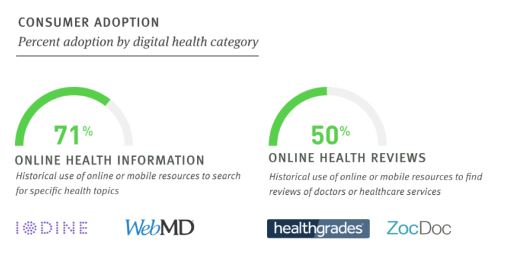 Following up on their report on consumerism in healthcare, Rock Health Managing Director Malay Gandhi sat down with a few entrepreneurs that are trying to make direct-to-consumer business models in healthcare work. They grappled with the question of whether an increase of patients engaging with their health really translates to viability for direct-to-consumer healthcare companies.
Following up on their report on consumerism in healthcare, Rock Health Managing Director Malay Gandhi sat down with a few entrepreneurs that are trying to make direct-to-consumer business models in healthcare work. They grappled with the question of whether an increase of patients engaging with their health really translates to viability for direct-to-consumer healthcare companies.
"There's a long-running theme among investors that D2C doesn't work in digital health or maybe in healthcare at all," Gandhi said in a Rock Health webinar. "[There's] an inability to scale, ... no business model, and there's this common theme that all the people using these are young, healthy, rich and educated people, the so-called worried well."
Rock Health's data shows that this isn't really the case -- if you include online health searches, 80 percent of internet-connected adults use some kind of direct-to-consumer health product and they're not all healthy folks. Unhealthiness, based on a combination of different self-reported metrics, was a major predictor of digital health technology usage.
Gandhi was joined by Doctor on Demand co-founder and CEO Adam Jackson, Amino founder and CEO David Vivero, and Justin Kao, SVP of Corporate Development, Operations, and Strategy at Helix, a direct-to-consumer genome service.
Vivero, whose healthcare transparency startup launched last week, articulated some of the difficulties of defining what exactly an empowered healthcare consumer looks like.
"The blessing and curse of consumerization of healthcare is people go to medical school for years to learn these things," he said. "And it is impossible to ask someone to go to a website for 20 minutes and be fully educated. But we're trying to figure out what are the types of data and information you can provide that help equip them to make the decisions that they need to make."
Some of the most interesting conversation on the webinar revolved around consumer doctor reviews, which 50 percent of connected adults in the Rock Health survey said they used. Vivero called them "too blunt an instrument" for helping people choose a care provider.
"What's so funny is you see people saying 'This is a Yelp for X' when really there shouldn't be a Yelp for [that]..." he said. In many of those cases, Yelp itself is enough, according to Vivero. "But I think when we look at healthcare there's so many incentives that can be created by reviews. There's so many issues around ballot-stuffing, and not knowing whether there was an actual visit tied to that review, then there's the nuance and personalization of going to see a hemotologist for your cancer treatment versus for your anemia and that being a totally different experience, even with the same doctor."
Jackson agreed, saying that the one-star reviews Doctor on Demand received on the app store tended to follow a very specific pattern: they were generally patients who wanted a doctor to prescribe them some particular thing but didn't get it. The company is careful not to "create this horrible incentive to just please patients instead of to practice good medicine."
Amino and Helix are both direct-to-consumer companies, while Doctor on Demand started out consumer focused and has now, like most telemedicine providers, begun to work mostly with employers. Still, Jackson says, the company is very careful in the development of its technology to design for the end user and foster trust between the patients on the system and their doctors.
Vivero was critical of the business-to-business-to-consumer approach of reaching patients via their health insurer, often referred to with the shorthand B2B2C, because it requires the designers of the product to serve too many masters, and making something work well for an HR manager sometimes comes at the expense of making it work well for a consumer.
"To me B2B2C is as mangled as it sounds," he said. "We're asking people to do something they've never ever done before, which is make a decision about where to get care in this very broad world. The data's bad, the topics are hard and the decisions are many. And so to have to layer on the complexity of also serving an employer or consumer, it's too much. We want to make it as accessible and people-centric as we can."

















